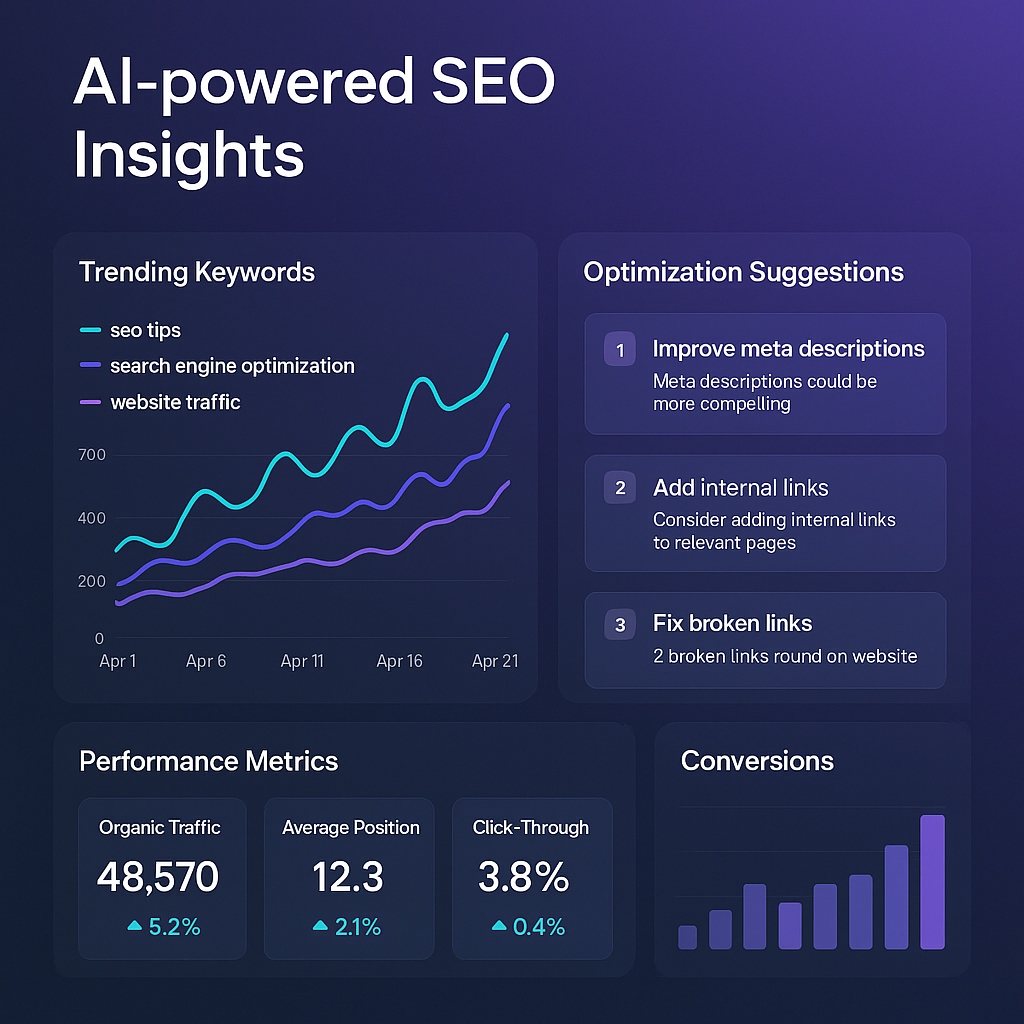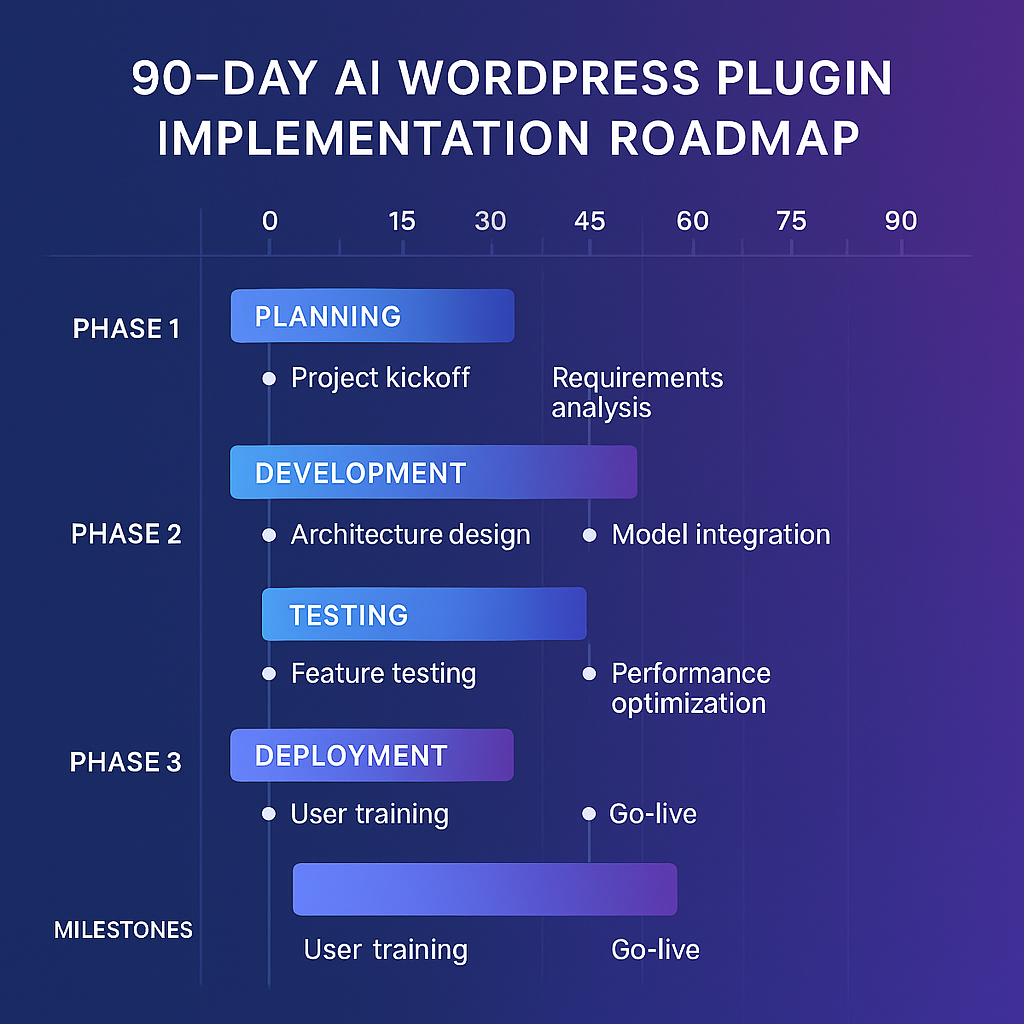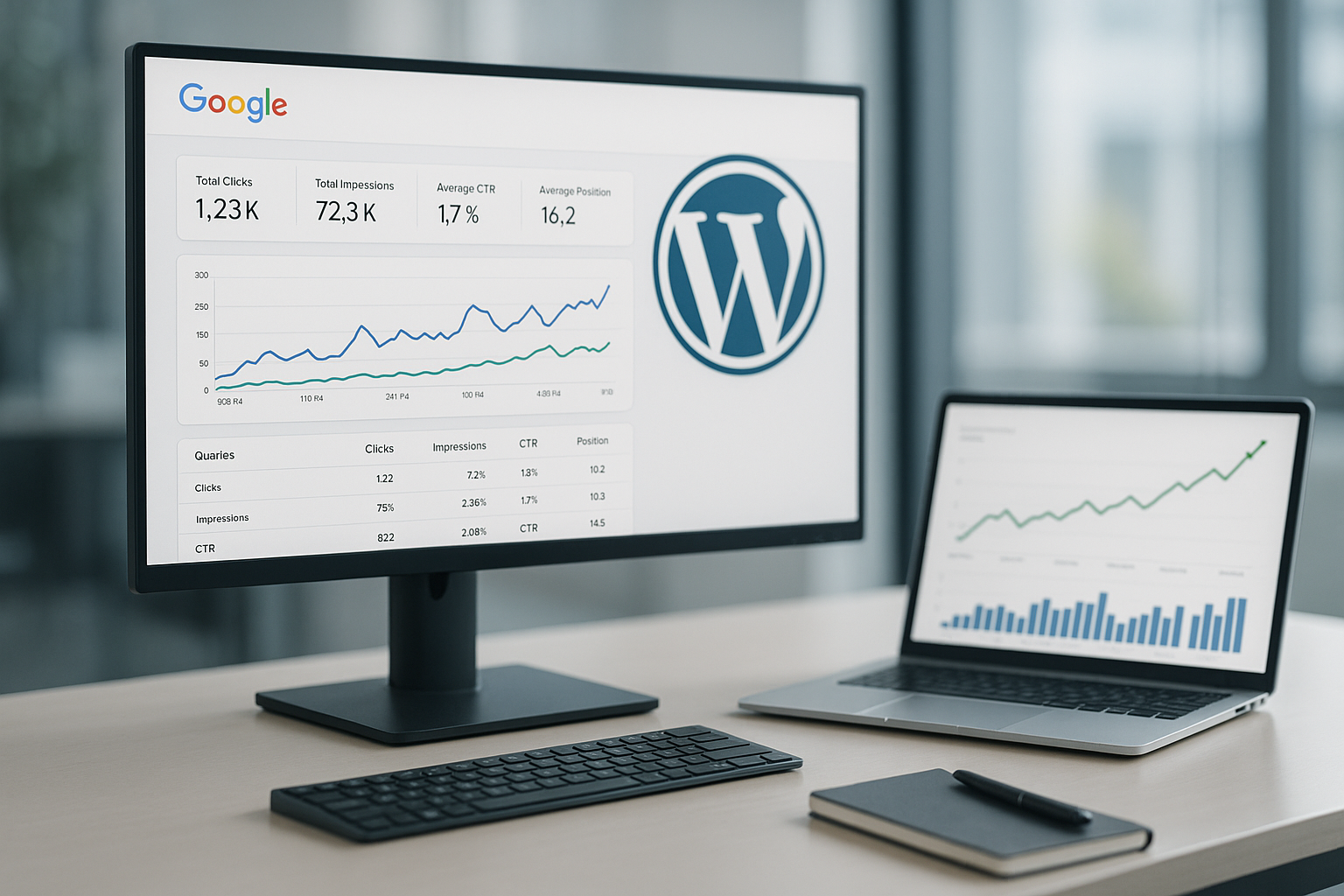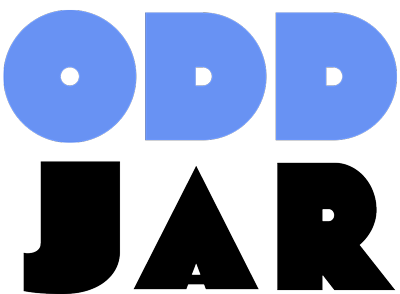Remember when adding a contact form to your WordPress site felt like rocket science? Well, buckle up, because we’re living in the future now. The artificial intelligence market is projected to reach a staggering $2.5 billion by 2025, and WordPress isn’t sitting on the sidelines. AI-powered plugins are transforming how we build, manage, and optimize websites – turning complex tasks into simple clicks and making every site owner feel like they have a team of digital experts at their fingertips.
Whether you’re a seasoned developer or someone who still calls the WordPress dashboard “that confusing admin thingy,” AI plugins are leveling the playing field. They’re writing content that sounds human, optimizing SEO better than most agencies, and even designing layouts that would make professional developers jealous.
In this comprehensive guide, we’ll explore the cream of the crop – the AI WordPress plugins that are actually worth your time and money in 2025. No fluff, no outdated recommendations, just real plugins solving real problems for real people.
How to Choose the Right AI WordPress Plugin for Your Needs
Before we dive into the exciting world of AI-powered WordPress wizardry, let’s establish some ground rules. Not all AI plugins are created equal, and choosing the wrong one can be like bringing a calculator to a rocket science exam – technically useful, but missing the point entirely.

Essential Selection Criteria
When evaluating AI WordPress plugins, focus on these critical factors:
- Performance Impact: The best AI plugins shouldn’t slow your site to a crawl. Look for plugins with load times under 2 seconds and minimal database queries.
- Accuracy & Reliability: AI that generates gibberish or provides wrong information is worse than no AI at all. Check user reviews for accuracy complaints.
- Integration Compatibility: Your AI plugin should play nicely with your existing theme, page builder, and other essential plugins.
- Cost vs. Value: Premium AI features often justify their cost, but beware of plugins that charge enterprise prices for basic functionality.
- Support & Updates: AI technology evolves rapidly. Choose plugins with active development and responsive support teams.
💡 Pro Tip: The 30-Day Test
Most quality AI plugins offer free trials or money-back guarantees. Take advantage of this! Install the plugin on a staging site and test it with your actual content for at least two weeks. AI tools often reveal their quirks after the initial honeymoon period.
Performance Benchmarks to Watch
Here are the performance metrics that separate the wheat from the chaff:
- Response Time: AI-generated content should appear within 10-30 seconds
- Accuracy Rate: Look for plugins boasting 85%+ accuracy in their specific domain
- Resource Usage: Memory usage should stay under 50MB for most AI plugins
- Uptime: AI services should maintain 99.5%+ uptime
Content Creation AI Plugins: Your Writing Assistant Army
Let’s face it – staring at a blank WordPress editor can be more intimidating than a horror movie. Content creation AI plugins are like having a brilliant writing partner who never runs out of ideas, never gets writer’s block, and works for the cost of a few cups of coffee per month.

The Content Creation Champions
| Plugin | Best For | Key Features | Pricing | Accuracy Rating |
|---|---|---|---|---|
| Jasper AI for WordPress | Long-form content | 50+ templates, brand voice training, plagiarism check | $49/month | 92% |
| WordLift | SEO-optimized content | Schema markup, entity linking, content recommendations | $59/month | 88% |
| ContentBot | Blog posts & social media | Bulk content generation, social media integration | $29/month | 85% |
| AI Engine | Budget-friendly option | GPT integration, custom prompts, content rewriting | $9.95/month | 82% |
| GetGenie AI | E-commerce descriptions | Product descriptions, meta tags, competitor analysis | $19/month | 89% |
Jasper AI for WordPress: The Content Powerhouse
Jasper AI has earned its reputation as the Swiss Army knife of content creation. What sets it apart is its ability to learn your brand voice and maintain consistency across all content. The WordPress integration is seamless, allowing you to generate content directly in your editor without leaving your dashboard.
The standout feature is the “Brand Voice” training, where you can feed Jasper examples of your writing style. After a week of training, it writes content that sounds remarkably like you – minus the coffee-induced typos and late-night rambling.
WordLift: The SEO-Smart Content Creator
WordLift approaches AI content creation from an SEO-first perspective. It doesn’t just generate content; it creates content that search engines love. The plugin automatically adds schema markup, links related entities, and suggests content improvements based on semantic SEO principles.
What makes WordLift special is its knowledge graph technology. It understands the relationships between concepts in your content and helps create more comprehensive, authoritative articles that Google rewards with higher rankings.
AI Engine: The Budget-Friendly Powerhouse
Don’t let the low price fool you – AI Engine packs serious punch for less than ten bucks a month. It integrates directly with OpenAI’s GPT models, giving you access to cutting-edge AI without the premium markup.
The plugin shines in its flexibility. You can create custom prompts for specific content types, set up automated content workflows, and even use it for content translation. It’s perfect for bloggers and small businesses who want AI superpowers without enterprise pricing.
SEO & Analytics AI: Making Google Your Best Friend
SEO used to be a dark art practiced by mysterious wizards who spoke in tongues about meta descriptions and canonical URLs. AI has changed all that, transforming SEO from guesswork into science. These plugins don’t just optimize your content – they predict what will work before you publish.

RankMath Pro with AI Features
RankMath Pro has evolved from a solid SEO plugin into an AI-powered optimization machine. The Content AI feature analyzes your content in real-time, suggesting improvements based on what’s currently ranking for your target keywords.
The AI-powered content suggestions are eerily accurate. It knows when your content is too thin, when you’re keyword stuffing, and even suggests related topics you should cover to boost topical authority. The plugin essentially reverse-engineers successful content in your niche and helps you create something better.
SurferSEO WordPress Integration
While not exclusively a WordPress plugin, SurferSEO’s WordPress integration brings data-driven content optimization directly to your editor. It analyzes the top 100 search results for your target keyword and provides a detailed content brief.
The real magic happens during writing. As you type, SurferSEO provides real-time feedback on content length, keyword density, semantic keywords, and content structure. It’s like having an SEO expert looking over your shoulder, but less annoying and more helpful.
MonsterInsights with AI-Powered Reports
MonsterInsights has added AI-powered insights to their Google Analytics integration, making data interpretation accessible to mere mortals. The AI analyzes your analytics data and provides plain-English explanations of what’s working and what isn’t.
Instead of staring at confusing charts wondering if that traffic spike was good or bad, the AI tells you exactly which content is performing, which traffic sources are most valuable, and what actions you should take to improve your results.
⚠️ Warning: Avoid the SEO AI Trap
Some AI SEO plugins promise to automatically optimize everything without your input. This is usually too good to be true. The best AI SEO tools enhance human decision-making rather than replace it entirely. Always review AI suggestions before implementing them, especially for critical pages.
Chatbot & Customer Service AI: Your 24/7 Digital Workforce
Remember the days when customer service meant hiring actual humans? How quaint. Today’s AI chatbots are so sophisticated that customers often prefer them to human agents – they’re faster, never have bad days, and don’t judge you for asking the same question three times.

WP Chatbot with AI Integration
WP Chatbot has evolved from simple automated responses to genuine AI-powered conversations. The latest version integrates with OpenAI’s GPT models to provide contextual, helpful responses that feel remarkably human.
What sets this apart from basic chatbots is its ability to understand context and maintain conversation flow. Customers can ask complex questions about your products or services, and the AI provides relevant, accurate answers based on your website content and knowledge base.
Tidio with AI Assistant
Tidio’s AI Assistant, affectionately named Lyro, is like having a customer service genius who never sleeps. It automatically handles up to 80% of customer inquiries, only escalating complex issues to human agents.
The AI learns from every conversation, getting smarter about your business over time. It can handle everything from basic product questions to complex troubleshooting, often resolving issues faster than human agents could.
IBM Watson Assistant for WordPress
For enterprise-level customer service, IBM Watson Assistant brings serious AI firepower to WordPress. It’s overkill for most small businesses, but perfect for companies handling thousands of customer inquiries daily.
Watson’s natural language processing is industry-leading, capable of understanding intent even in poorly worded questions. It integrates with your existing CRM and help desk systems, creating a seamless customer service experience.
Image & Media AI Plugins: Visual Content Made Simple
Creating stunning visual content used to require either serious design skills or a healthy budget for stock photos. AI has democratized visual content creation, making it possible for anyone to generate professional-quality images, optimize photos, and even create custom graphics.

| Plugin | Primary Function | Key Features | Pricing | Quality Rating |
|---|---|---|---|---|
| DALL-E Integration | Image generation | Text-to-image, custom sizes, unlimited variations | $20/month | 95% |
| Imagify AI | Image optimization | Smart compression, format conversion, bulk optimization | $9.99/month | 92% |
| WP Image AI | Alt text & SEO | Auto alt text, image SEO, accessibility compliance | $15/month | 88% |
| Canva AI for WordPress | Design automation | Auto-resize, brand consistency, template generation | $12.99/month | 90% |
| Remove.bg Plugin | Background removal | One-click background removal, batch processing | $9/month | 94% |
DALL-E WordPress Integration: Unlimited Creative Potential
The DALL-E integration plugin brings OpenAI’s incredible image generation directly to your WordPress media library. Need a custom illustration for your blog post? Just describe what you want, and DALL-E creates it in seconds.
What makes this particularly powerful is the ability to generate images that perfectly match your content. No more scrolling through stock photo sites hoping to find something close to what you need. Describe exactly what you want, and get exactly what you describe.
Imagify AI: Smart Image Optimization
Imagify AI takes the guesswork out of image optimization. Its AI analyzes each image and applies the perfect compression settings to maintain quality while minimizing file size. The result? Faster loading times without sacrificing visual appeal.
The smart resize feature is particularly impressive for responsive design. Instead of just scaling images down, the AI identifies the most important parts of each image and crops intelligently for different screen sizes.
WP Image AI: Accessibility and SEO Automation
WP Image AI solves one of the most tedious aspects of content creation – writing alt text for images. The AI analyzes your images and generates descriptive, SEO-friendly alt text automatically.
Beyond alt text, it optimizes image filenames, adds relevant keywords, and ensures your images contribute to your overall SEO strategy. It’s especially valuable for sites with large image libraries or frequent visual content updates.
🚀 Quick Win: Batch Optimize Your Media Library
If you have hundreds of unoptimized images, use Imagify AI’s bulk optimization feature. Run it overnight and wake up to a significantly faster website. Most users see 30-50% improvement in page load times after optimizing their entire media library.
Page Builder AI Integration: Design Without the Design Degree
Page builders revolutionized WordPress design, but they still required a decent eye for layout and design principles. AI integration has changed that, bringing intelligent design assistance that helps create professional layouts regardless of your design experience.
Elementor AI: Your Design Co-Pilot
Elementor AI doesn’t just build pages – it understands design principles and applies them automatically. Tell it what kind of page you need, and it generates a complete layout with appropriate color schemes, typography, and spacing.
The AI considers your brand colors, existing design elements, and the purpose of your page. Need a landing page for a product launch? The AI creates a conversion-optimized layout with strategic placement of call-to-action buttons and social proof elements.
Divi AI: Intelligent Layout Suggestions
Divi AI analyzes your content and suggests optimal layouts based on proven design patterns. It’s like having a design consultant who’s studied thousands of high-converting pages and knows exactly what works.
The smart text feature is particularly useful – it can rewrite your content to better fit design layouts, suggest headlines that work with specific templates, and even optimize text length for mobile viewing.
Beaver Builder AI Assistant
Beaver Builder’s AI assistant focuses on practical design improvements. It analyzes your layouts for common design mistakes and suggests improvements for better user experience and conversion rates.
The accessibility checker is especially valuable, ensuring your designs work for users with disabilities while maintaining visual appeal. It’s like having a UX expert review every page before it goes live.
Pricing Analysis & ROI: Making Smart Investment Decisions
AI plugins represent a significant shift in how we think about WordPress investments. Instead of one-time purchases, most AI tools require ongoing subscriptions to access cloud-based processing power. Understanding the true cost and potential return is crucial for making smart decisions.
| Plugin Category | Average Monthly Cost | Time Saved (Hours/Month) | Equivalent Freelancer Cost | ROI Timeline |
|---|---|---|---|---|
| Content Creation | $35 | 20-30 hours | $800-1200 | Immediate |
| SEO Optimization | $45 | 15-25 hours | $900-1500 | 1-2 months |
| Image Creation | $25 | 10-15 hours | $400-750 | 2-3 weeks |
| Customer Service | $50 | 40-60 hours | $800-1200 | Immediate |
| Design & Layout | $30 | 12-20 hours | $600-1200 | 2-4 weeks |
Calculating Your AI Plugin ROI
The return on investment for AI plugins extends beyond simple time savings. Here’s how to calculate the real value:
- Time Savings: Track how many hours you save on routine tasks
- Quality Improvement: Measure improvements in content performance, SEO rankings, and user engagement
- Opportunity Cost: Consider what you can accomplish with the freed-up time
- Skill Gap Bridging: Value the professional-level work you can now produce without hiring specialists
Smart Investment Strategies
Start small and scale up. Begin with one AI plugin that addresses your biggest pain point, measure the results, then gradually add more tools as you prove their value. Most successful AI adopters follow this progression:
- Month 1-2: Content creation AI (biggest immediate impact)
- Month 3-4: SEO optimization AI (long-term growth)
- Month 5-6: Image and design AI (visual improvement)
- Month 7+: Specialized tools based on specific needs
Implementation Roadmap: Your 90-Day AI Transformation
Implementing AI plugins isn’t just about installation – it’s about fundamentally changing how you approach website management. This roadmap ensures smooth adoption without overwhelming your workflow or breaking your site.
Phase 1: Foundation (Days 1-30)
Week 1: Assessment and Planning
- Audit your current workflow and identify time-consuming tasks
- Set up a staging environment for testing AI plugins
- Create baseline measurements for content creation time, SEO performance, and user engagement
- Choose your first AI plugin based on your biggest pain point
Week 2-3: Installation and Basic Setup
- Install your chosen plugin on the staging site
- Complete initial configuration and API key setup
- Test basic functionality with sample content
- Train team members on basic usage
Week 4: Testing and Refinement
- Create real content using the AI plugin
- Compare AI-generated content with your manual work
- Adjust settings and prompts based on results
- Document best practices and common issues
Phase 2: Expansion (Days 31-60)
Week 5-6: Deploy to Production
- Move the tested plugin to your live site
- Begin using AI for regular content creation
- Monitor performance impact and user experience
- Gather feedback from team members and site visitors
Week 7-8: Add Second Plugin
- Choose your second AI plugin (typically SEO or image optimization)
- Repeat the testing process on staging
- Ensure compatibility with your existing AI plugin
- Train team on the expanded AI toolkit
Phase 3: Optimization (Days 61-90)
Week 9-10: Workflow Integration
- Create standardized processes for AI-assisted content creation
- Develop quality control checklists
- Optimize AI prompts and settings based on performance data
- Consider additional specialized plugins
Week 11-12: Performance Analysis and Scaling
- Measure improvements in productivity and content quality
- Calculate actual ROI based on time savings and performance gains
- Plan for additional AI tool adoption
- Share learnings with the broader team or community
Common Pitfalls & Troubleshooting: Learning from Others’ Mistakes
AI plugins are powerful, but they’re not magic wands. Understanding common issues and how to avoid them can save you hours of frustration and potentially embarrassing content mistakes.
The “Set It and Forget It” Trap
The biggest mistake new AI users make is treating these tools like traditional plugins that work independently. AI requires ongoing training and refinement. Your first AI-generated content will likely need significant editing – that’s normal and expected.
Solution: Plan for a learning curve. Allocate extra time in the first month for reviewing and refining AI output. Most users find the sweet spot around week 3-4 when AI suggestions align well with their style and needs.
Over-Reliance on AI Suggestions
AI is incredibly persuasive. When it suggests changes to your content or design, it’s easy to assume it knows best. However, AI lacks understanding of your specific audience, brand nuances, and business goals.
Solution: Use AI as a creative partner, not a replacement for human judgment. Always review suggestions in the context of your brand voice and audience needs. When in doubt, A/B test AI suggestions against your original content.
Plugin Conflicts and Performance Issues
AI plugins are resource-intensive and can conflict with certain themes or other plugins. Common issues include slow loading times, memory errors, and unexpected behavior with caching plugins.
Solution: Always test on staging first. Monitor your site’s performance after installing AI plugins and be prepared to adjust settings or switch hosting plans if needed. Most quality AI plugins include performance optimization features.
⚠️ Critical Warning: API Key Security
AI plugins require API keys that often have spending limits. Store these securely and monitor usage regularly. A runaway process could result in unexpected charges. Set up billing alerts and usage limits in your AI service accounts.
Content Quality Control Issues
AI can generate plausible-sounding content that’s factually incorrect or inappropriate for your audience. It’s particularly prone to outdated information and can sometimes generate biased or insensitive content.
Solution: Implement a human review process for all AI-generated content. Create checklists that include fact-checking, tone review, and brand alignment. Never publish AI content without human oversight, especially for sensitive topics.
SEO Over-Optimization
AI SEO tools can be overly aggressive, leading to content that’s optimized for search engines but unreadable for humans. This can actually hurt your rankings and user experience.
Solution: Balance AI SEO suggestions with readability. If content starts feeling robotic or keyword-stuffed, dial back the AI recommendations. Remember, Google prioritizes user experience over keyword density.
Industry-Specific Recommendations: Tailored AI Solutions
Different industries have unique content needs and challenges. Here’s how to choose AI plugins based on your specific sector and requirements.

E-commerce Sites
E-commerce sites benefit most from AI plugins that handle product descriptions, customer service, and personalization. The key is choosing tools that understand commercial intent and conversion optimization.
Recommended Stack:
- GetGenie AI for product descriptions and category pages
- Tidio AI for customer service automation
- WP Image AI for product image optimization and alt text
- MonsterInsights AI for conversion tracking and insights
Professional Services & Agencies
Service-based businesses need AI that helps establish authority and trust. Focus on content creation tools that can produce in-depth, expertise-driven content and client communication tools.
Recommended Stack:
- Jasper AI for thought leadership content and case studies
- WordLift for semantic SEO and authority building
- Elementor AI for professional landing pages
- IBM Watson Assistant for sophisticated client inquiries
Bloggers & Content Creators
Content creators need AI that enhances creativity without replacing their unique voice. The focus should be on ideation, optimization, and visual content creation.
Recommended Stack:
- AI Engine for cost-effective content assistance
- RankMath Pro for SEO optimization
- DALL-E Integration for custom visuals
- Canva AI for social media graphics
Educational Institutions
Educational sites require AI that supports learning objectives while maintaining accuracy and accessibility. Compliance and multilingual support are often critical.
Recommended Stack:
- WordLift for educational content structure
- WP Image AI for accessibility compliance
- Beaver Builder AI for accessible design
- WP Chatbot for student support
Future Trends: What’s Coming in AI WordPress Development
The AI revolution in WordPress is just getting started. Understanding emerging trends helps you make investment decisions that won’t become obsolete in six months.
Predictive Content Optimization
The next generation of AI plugins will predict content performance before publication. Instead of optimizing after the fact, AI will analyze current trends, competitor content, and search patterns to suggest content that’s likely to perform well.
What to expect: Plugins that recommend topics, predict viral potential, and suggest optimal publishing times based on your audience behavior patterns.
Voice and Conversational AI Integration
Voice search optimization is evolving beyond keywords to natural conversation patterns. Future AI plugins will optimize content for voice assistants and create more conversational, accessible content.
What to expect: Content that’s automatically optimized for voice search, AI that can rewrite content in conversational tones, and integration with smart speakers and voice assistants.
Real-Time Personalization
AI will soon personalize content in real-time based on visitor behavior, preferences, and intent. This goes beyond simple geo-targeting to create truly individualized experiences.
What to expect: Dynamic content that changes based on visitor history, AI-powered A/B testing that optimizes in real-time, and personalized product recommendations that improve automatically.
Integrated AI Ecosystems
Instead of individual AI plugins, we’re moving toward comprehensive AI ecosystems where different tools work together seamlessly. Your content AI will communicate with your SEO AI, which will coordinate with your design AI.
What to expect: Plugin suites that share data and learnings, unified AI dashboards for all website functions, and AI assistants that can handle complex, multi-step tasks automatically.
Frequently Asked Questions
Q: Will AI plugins slow down my website?
A: Quality AI plugins process most computations in the cloud, so they shouldn’t significantly impact your site speed. However, plugins that generate content on-demand or process large amounts of data can cause temporary slowdowns. Always test performance on staging before deploying to production.
Q: Can I use multiple AI plugins together?
A: Yes, but compatibility varies. Content creation and SEO AI plugins generally work well together, but multiple chatbot plugins might conflict. Start with one plugin per category and test thoroughly before adding more.
Q: How do I ensure AI-generated content matches my brand voice?
A: Most quality AI plugins offer brand voice training features. Feed the AI examples of your best content, create detailed style guides, and spend time refining prompts. Expect a 2-3 week learning curve before the AI consistently matches your voice.
Q: Are AI plugins worth it for small websites?
A: Absolutely. Small sites often benefit most from AI because they typically have limited resources for content creation and optimization. Start with budget-friendly options like AI Engine or basic versions of premium plugins.
Q: What happens if an AI service goes down?
A: Most plugins have fallback options or graceful degradation. Your site won’t break, but AI features will be temporarily unavailable. Choose plugins from established providers with good uptime track records.
Q: How do I handle AI-generated content for SEO?
A: Google doesn’t penalize AI content specifically, but it does penalize low-quality content. Always review and edit AI output, add your unique insights, and ensure it provides genuine value to readers. The key is using AI to enhance, not replace, human expertise.
Q: Can AI plugins help with GDPR compliance?
A: Some AI plugins include privacy features, but they’re not specifically designed for GDPR compliance. You’ll still need dedicated privacy plugins and proper legal review. AI chatbots, in particular, require careful configuration to handle personal data appropriately.
Conclusion: Your AI-Powered WordPress Future Starts Now
We’ve covered a lot of ground in this comprehensive guide to AI WordPress plugins, and if your head is spinning a bit, that’s completely normal. The AI landscape changes rapidly, and the sheer number of options can feel overwhelming. But here’s the thing – you don’t need to implement everything at once.

The AI revolution in WordPress isn’t coming – it’s already here. The question isn’t whether you should adopt AI plugins, but how quickly you can start benefiting from them. Every day you wait is a day your competitors might be publishing better content faster, optimizing more effectively, and serving customers more efficiently.
Your Next Steps: The 7-Day Action Plan
Don’t let analysis paralysis keep you from getting started. Here’s your concrete action plan for the next week:
- Day 1: Identify your biggest pain point (content creation, SEO, customer service, or design)
- Day 2: Choose one AI plugin from this guide that addresses that pain point
- Day 3: Set up a staging environment and install your chosen plugin
- Day 4: Test the plugin with sample content and configure basic settings
- Day 5: Create your first real piece of content using the AI plugin
- Day 6: Refine your prompts and settings based on the results
- Day 7: Plan your expansion to additional AI tools
Remember: AI Enhances, It Doesn’t Replace
The most successful AI adopters understand that these tools amplify human creativity and expertise rather than replacing them. Your unique perspective, industry knowledge, and understanding of your audience remain irreplaceable. AI just makes you faster, more consistent, and capable of producing higher-quality work.
A Quick Disclosure (With a Smile)
Full transparency – we’re the team behind Odd Jar, and yes, we’re probably a bit biased toward WordPress solutions. But our recommendations in this guide are based on real testing, user feedback, and industry performance. We want you to succeed with AI, whether you use our tools or not. A rising tide lifts all boats, and a smarter WordPress community benefits everyone.
The Future Is Collaborative
As AI continues to evolve, the most exciting developments won’t be about replacing human work – they’ll be about enhancing human potential. The AI plugins we’ve discussed are just the beginning. We’re moving toward a future where your WordPress site anticipates needs, optimizes itself, and helps you create content that truly resonates with your audience.
The best time to start with AI was yesterday. The second-best time is right now. Choose one plugin, start experimenting, and begin your journey toward a more intelligent, efficient, and successful WordPress site.
Your AI-powered WordPress future starts with a single click. What are you waiting for?

